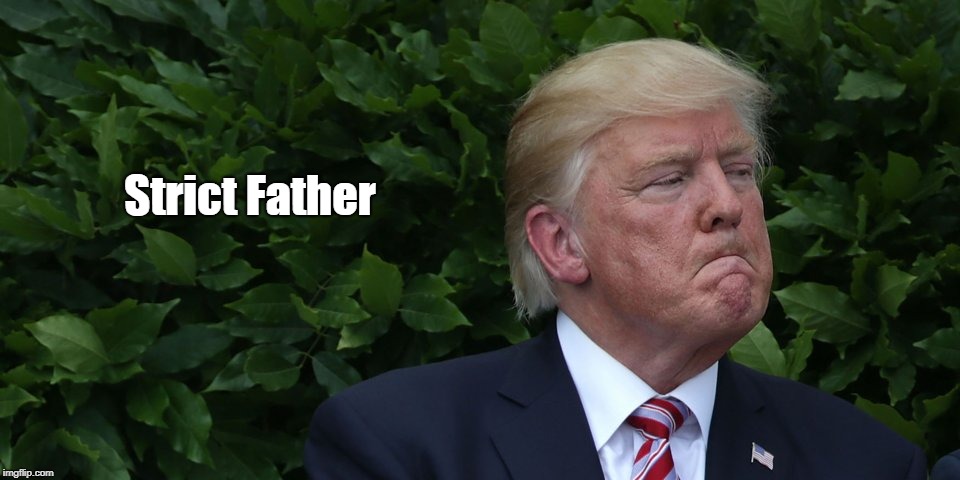/cdn.vox-cdn.com/uploads/chorus_image/image/60063913/GettyImages_965624104.0.jpg)
Friend JN writes:
"After 20 years of supervising some of NC's largest foster care agencies, it makes me sick to witness the damage we are doing to the children separated from their parents at the US border.
It is nothing less than evil, systematic child abuse in it's own right.
I hate to compare it to Nazi Germany but these children are being victimized and emotionally raped for political posturing and manipulation.
Anyone who thinks that taking a child from a healthy parent is okay should be required to provide foster care to children who are emotionally damaged.
Our governments actions are exactly what experts in the field would expect from low life "swamp dwellers" and child molesters!"
Follow-up Facebook Comments:

Were You Raised By A "Strict Father?"
Or An "Indulgent Parent?"
Here is Lakoff's explanation of "Strict Father" psychology and how "Strict Father" values determine the structure of "the conservative psyche."
Quote:
"We tend to understand the nation metaphorically in family terms: We have founding fathers. We send our sons and daughters to war. We have homeland security. The conservative and progressive worldviews dividing our country can most readily be understood in terms of moral worldviews that are encapsulated in two very different common forms of family life: The "nurturant parent" family (progressive) and the "strict father" family (conservative).
What do social issues and politics have to do with the family?
We are first governed in our families, and so we grow up understanding governing institutions in terms of the governing systems of families.
We are first governed in our families, and so we grow up understanding governing institutions in terms of the governing systems of families.
In the strict father family, "father knows best." He knows right from wrong and has the ultimate authority to make sure his children and his spouse do what he says, which is taken to be what is right.
Many conservative spouses accept this worldview, uphold the father’s authority, and are strict in those realms of family life that they are in charge of. When his children disobey, it is his moral duty to punish them painfully enough so that, to avoid punishment, they will obey him (do what is right) and not just do what feels good.
Through physical discipline they are supposed to become disciplined, internally strong, and able to prosper in the external world.
What if they don’t prosper? That means they are not disciplined, and therefore cannot be moral, and so deserve their poverty.
This reasoning shows up in conservative politics in which the poor are seen as lazy and undeserving, and the rich as deserving their wealth.
(In "Strict Father" psychology), responsibility is taken to be personal responsibility, not social responsibility. What you become is only up to you; society has nothing to do with it. You are responsible for yourself, not for others — who are responsible for themselves." https://georgelakoff.com/2016/03/02/why-trump/

Here are Wikipedia's entries for these two basic psychological orientations.
Strict Father Model: https://en.wikipedia.org/wiki/Strict_father_model
Nurturant Parent Model: https://en.wikipedia.org/wiki/Nurturant_parent_model
"Strict Father upbringing" creates a frame of mind that values "absolute rightness" over all else. In the conservative view, the mere fact of "being right" guarantees, deus ex machina, that all subsequent outcomes are good ones.
Recently, friend John N dialogued with Tom L on his Facebook page. In that exchange, John, a child psychologist, made clear that the Trump administation is abusing children by separating them from their families at the U.S.-Mexico border. John also pointed out that the inevitable damage done to these kids will often result in lasting devastation.
http://www.pbs.org/childofcamp/history/health.htmlImagine yourself as a five year old kid separated from your parents and put in a holding pen reminiscent of California's World War II internment camps without knowing if you will ever see your family again.
In the balance between "rigid, punitive righteousness" and "mercy-compassion-love," people whose psyches are ruled by "Strict Father values" fear the loss of their identity (often co-terminous with loss of religion) if wrong-doers are not painfully punished.
"Strict Father" psychology holds that anyone who fails to respect The Law (in all its minute manifestations) deserves to be damaged -- indeed, should be damaged just as God, in "His" justice, roasts wrong-doers in The Lake Of Everlasting Fire.
According to conservative orthodoxy, the "righteous sequence" of "wrongdoing-punishment-damage" must be applied to uphold The World Order, which - according to conservative belief - can only survive/endure through rigid enforcement of "Strict Father" Law.
According to conservative orthodoxy, the "righteous sequence" of "wrongdoing-punishment-damage" must be applied to uphold The World Order, which - according to conservative belief - can only survive/endure through rigid enforcement of "Strict Father" Law.
Ever since I was a '60s student at the University of Toronto, I have studied comparative religion.
As I mature, it becomes ever clearer that conservative Christians are more "at home" in The Old Testament -- with its core moral principle of "an eye for an eye and a tooth for a tooth" -- than they are "at home" with the moral code of The New Testament whose central teaching is love, forgiveness and "doing good, even to those who persecute us."
Consider The Gospel Of Matthew's view of love: https://www.biblegateway.com/passage/?search=Matthew+5%3A38-48&version=NIV
The Gospel Of Luke weighs in with another view of Love's centrality: https://www.biblegateway.com/passage/?search=Luke+6%3A+24-38&version=MSG I have used a recent translation of Luke called "The Message." Translator Eugene H. Peterson made it his goal to be "true to the spirit" of the original Greek text in order to avoid the pitfall of being lulled into "sleepy misunderstanding" by words we've heard a thousand times in the grandiloquent King James Version. )
Clearly, we are free to choose our course in life.
In making that choice however, it is both good and wise to know where our moral principles come from.


No comments:
Post a Comment